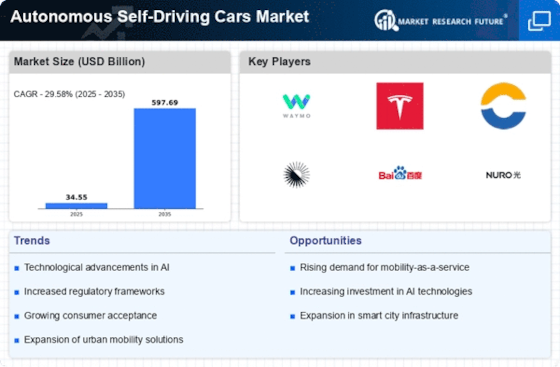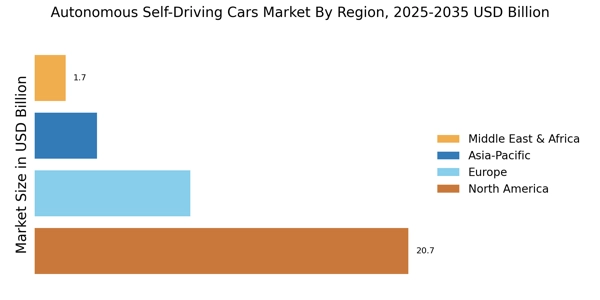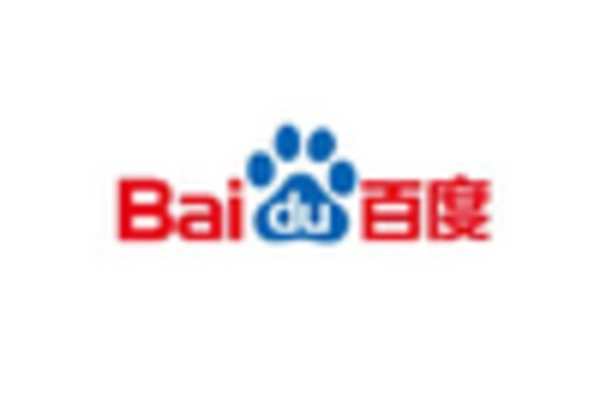Consumer Demand for Safety
Consumer demand for enhanced safety features is a pivotal driver in the Autonomous Self-Driving Cars Market. As road safety remains a pressing concern, autonomous vehicles are perceived as a solution to reduce accidents caused by human error. Data suggests that approximately 94% of serious crashes are attributed to human mistakes, underscoring the potential of autonomous technology to mitigate these risks. The Autonomous Self-Driving Cars Market is responding to this demand by incorporating advanced safety systems, such as automatic emergency braking and lane-keeping assistance. This focus on safety not only attracts consumers but also garners support from regulatory bodies, further propelling the market forward. As public awareness of safety benefits increases, the market is expected to expand, driven by consumer confidence in autonomous driving technologies.
Technological Advancements
The Autonomous Self-Driving Cars Market is experiencing rapid technological advancements that are reshaping the landscape of transportation. Innovations in artificial intelligence, machine learning, and sensor technologies are enhancing the capabilities of autonomous vehicles. For instance, the integration of LiDAR and computer vision systems allows for improved navigation and obstacle detection. According to recent data, the market for autonomous vehicle sensors is projected to reach USD 30 billion by 2026, indicating a robust growth trajectory. These advancements not only improve safety but also enhance user experience, making autonomous vehicles more appealing to consumers. As technology continues to evolve, the Autonomous Self-Driving Cars Market is likely to witness increased adoption rates, driven by the promise of safer and more efficient transportation solutions.
Environmental Sustainability
The growing emphasis on environmental sustainability is a crucial driver for the Autonomous Self-Driving Cars Market. As concerns about climate change and air pollution escalate, there is a pressing need for cleaner transportation alternatives. Autonomous vehicles, particularly electric ones, are seen as a viable solution to reduce carbon emissions and promote sustainable urban mobility. The market for electric autonomous vehicles is projected to grow significantly, with estimates suggesting a compound annual growth rate of over 20% in the coming years. This shift towards sustainability is not only driven by consumer preferences but also by regulatory pressures aimed at reducing emissions. The Autonomous Self-Driving Cars Market is thus positioned to capitalize on this trend, as manufacturers increasingly focus on developing eco-friendly autonomous solutions that align with global sustainability goals.
Regulatory Support and Frameworks
Regulatory support and the establishment of comprehensive frameworks are essential drivers for the Autonomous Self-Driving Cars Market. Governments worldwide are recognizing the potential benefits of autonomous vehicles and are actively working to create conducive regulatory environments. This includes developing guidelines for testing and deploying autonomous technologies on public roads. Recent initiatives indicate that several countries are implementing pilot programs to assess the safety and efficacy of autonomous vehicles. Such regulatory advancements not only foster innovation but also instill public confidence in autonomous driving technologies. As regulatory frameworks become more defined, the Autonomous Self-Driving Cars Market is likely to experience accelerated growth, as manufacturers gain clarity on compliance requirements and consumers feel more secure in adopting autonomous solutions.
Urbanization and Traffic Congestion
The rise of urbanization and increasing traffic congestion are significant factors influencing the Autonomous Self-Driving Cars Market. As urban populations grow, the demand for efficient transportation solutions intensifies. Autonomous vehicles offer a potential remedy to alleviate traffic congestion by optimizing traffic flow and reducing the number of vehicles on the road. Studies indicate that autonomous vehicles could reduce traffic congestion by up to 30%, thereby enhancing urban mobility. This potential for improved traffic management is attracting investments and interest from city planners and policymakers. Consequently, the Autonomous Self-Driving Cars Market is likely to benefit from urbanization trends, as cities seek innovative solutions to address transportation challenges. The integration of autonomous vehicles into urban environments could lead to a more sustainable and efficient transportation ecosystem.

















